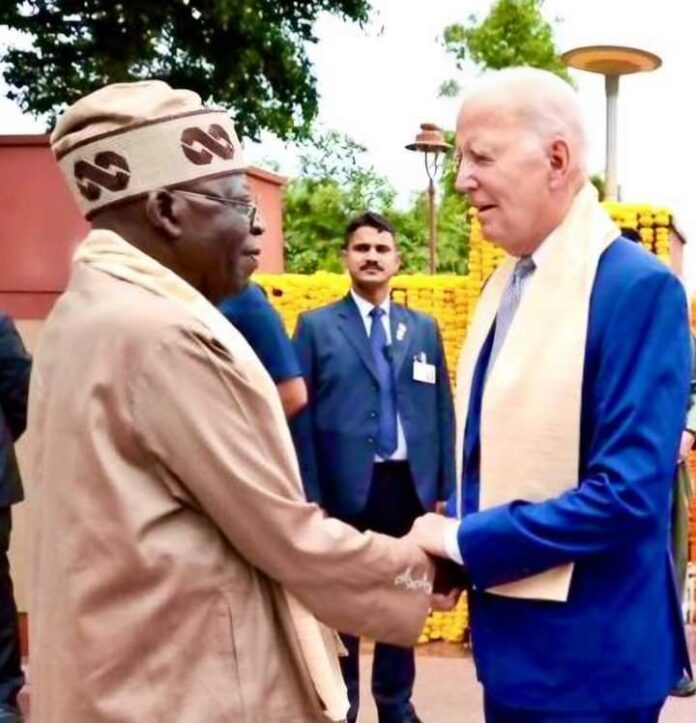Nigeria and the U.S.: Economic Allies or Political Pawns? By Haroon Aremu
POLITICS DIGEST – After a fierce contention between Vice President Kamala Harris and Donald Trump for the next occupant of the Oval Office in the White House with the latter emerging victorious, President Bola Ahmed Tinubu’s congratulatory message to the President-elect reignited intense discussion about the relationship between both nations.
The president’s expression of eagerness to strengthen ties between Nigeria and the United States raises questions. Has the partnership between both countries truly benefited Nigeria? Or was Mr. President’s call merely another political courtesy? These questions prompts us to examine the nature of Nigeria’s relationship with the U.S., its economic implications, and the broader political dynamics at play.
Nigeria and the U.S. have maintained a long-standing economic relationship, with Nigeria being one of America’s top trading partners in Africa. In 2019, bilateral trade between the two nations exceeded $10 billion, and the U.S. remains Nigeria’s largest foreign investor, particularly in the oil and gas sector.
However, Nigeria’s economy continues to face significant struggles, primarily due to its over-reliance on oil. With global shifts toward renewable energy, including in the U.S., Nigeria must diversify its economy to remain competitive and avoid being left behind.
Critics argue that while the U.S.-Nigeria partnership has brought some benefits, these advantages are not felt equitably across the population. The wealth generated from trade and investment largely remains concentrated in the oil sector, leaving many Nigerians excluded from broader economic gains. The promise of diversification remains largely unfulfilled, and the average citizen continues to bear the brunt of the country’s dependence on oil.
The political dynamics of the U.S. and Nigeria share striking similarities, particularly in their recent elections. Both the 2020 U.S. election between Donald Trump and Jeo Biden and Nigeria’s 2023 election, where Bola Tinubu contested mainly against Peter Obi and Atiku Abubakar, were “reportedly” marred by allegations of fraud, electoral manipulation, and identity politics. Just as many Americans questioned the integrity of their electoral process, Nigerians also faced concerns over corruption and electoral malpractice.
But Nigeria can learn from the U.S. by adopting reforms that promote certain level of transparency, credibility, and inclusiveness in its electoral system as witnessed in 2024.
While the U.S. system has its challenges, its efforts to ensure a fair and free election through checks and balances offer valuable lessons for Nigeria, which must work to eliminate corruption and build public trust in the electoral process.
These reforms will help create an electoral system that truly reflects the will of the people and ensures fair participation for all.
Transparency, accountability, and the active participation of civil society will be key to improving Nigeria’s elections and ensuring the will of the people is truly reflected in government.
Read Also:
Nigeria’s economy faces pressing challenges, including inflation rates of over 30% and a soaring unemployment rate. The country’s dependence on oil exports leaves it vulnerable to global market fluctuations.
The need for diversification has never been more urgent. Nigeria must expand into sectors like agriculture, technology, and manufacturing to create a more sustainable and resilient economy.
While U.S.-Nigeria partnerships in agriculture, technology, and infrastructure development have created some jobs, the benefits are often limited. Without proper policies and management, the economic gains from these partnerships fail to reach those who need them most. Corruption continues to hinder inclusive growth, with the wealth generated by foreign investments rarely benefiting the broader population.
The U.S. has provided substantial aid to Nigeria over the years, including over $125 million in COVID-19 assistance and various health initiatives, such as PEPFAR, which has improved healthcare access.
Educational programs have also had a significant impact, providing millions of books and teaching resources to Nigerian schools. However, critics argue that much of this aid addresses immediate needs without addressing the deeper, systemic issues—such as corruption, poor governance, and institutional inefficiency—that continue to hinder long-term development.
Though aid has brought some short-term relief, Nigeria must push for real, lasting change. It is not enough to rely on external assistance without addressing the root causes of poverty, unemployment, and economic instability.
Development cannot be achieved through aid alone—it requires internal reforms and institutional strengthening.
To President Bola Ahmed Tinubu, Nigeria is at a critical juncture, facing significant economic challenges, including the risk of recession, but the partnership with the United States offers an opportunity to stimulate growth, attract investment, and create jobs.
While the World Bank acknowledges Nigeria’s efforts through macro-fiscal reforms like unifying exchange rates and phasing out gasoline subsidies, these changes must be carefully managed to minimize short-term negative impacts on vulnerable groups.
Scaling up social protection programs, investing in key sectors such as education, healthcare, and infrastructure, and promoting economic diversification into areas like agriculture, technology, and manufacturing are essential to reducing reliance on oil and ensuring long-term stability.
The World Bank’s $2.25 billion funding through the RESET program can enhance revenue mobilization, improve governance, and foster private sector growth.
It is crucial for Nigeria to strengthen its dialogue with the U.S., showcase investment opportunities, and deepen cooperation on security. Moving forward, Nigeria must prioritize real, actionable partnerships that deliver sustainable benefits to its people, avoid actions akin to political fraternization and focus on inclusive development.
The world is watching, and now is the time for decisive action to secure Nigeria’s future.
Haroon Aremu Abiodun, author of ‘Youth Service for National Stability: A Corpers’ Chronicle,’ is an advocate for national development, an award recipient at PRNigeria Center, and an investigative research journalist. He can be reached at [email protected]
















